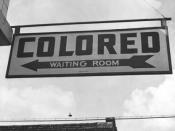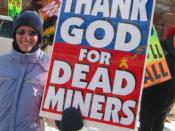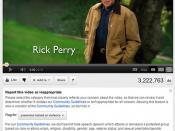Ever since the establishment of the First Amendment, there seemed to be controversy, as to what point an individual can take his verbal freedoms and symbolic expressions. What might have been accepted by society fifty years ago has drastically changed and will continue to do so as our culture evolves. Likewise, our views on certain hateful phrases directed at different individuals and social groups affect us in a whole new way. Our standards have changed so much that it's nearly impossible to keep a constant law that would satisfy those supporting the First Amendment while protecting the ones degraded by it. Everyone immigrating to this country greatly appreciates the fact that you're granted with many freedoms, but how do we punish those who take those freedoms to extreme levels? What may seem as an appropriate statement to represent one's feelings about a certain issues may not necessarily be accepted by the majority.
What perplexes us most is how do we create a law that will keep the delicate balance between right and wrong? According to Richard Goldstein, in his writing "Hate Speech, Free Speech and the Unspoken", he represents his perspective on the debate of banning hate speech. There are certain criteria that must be used in determining the imposing threat of "fighting speech". Some situations may require a certain degree of harsh speech, while others are just a mere example of ignorance and abuse of one's privileges. A proposed solution to this problem arises with the implication of regulating "content-neutral" speech. Content -neutral speech is a way of analyzing whether a statement is a threat merely by looking at the crime itself instead of considering words themselves as part of the speaker's motivation in premeditating his actions. Punishing an individual on the basis of what he says, rather than on the intentional relevance of his words, is unjust and jeopardizes ones rights to express personal thought because it gives too much authority to those who may take advantage of it while depriving us of basic constitutional principles initially offered by the First Amendment.
Hateful speech can be expressed by a wide array of ways. Verbal expression is no less exemplary of violence than is a symbolic one. It's often hard to distinguish at which point an offensive gesture or phrase may be the cause of later violence against an individual.
In the harsh years of the nineteen fifties when color separation among blacks and whites in the United States was still thriving an discourteous remark of a racist remark made by a white individual may not have been even considered offensive. In contemporary times however, the general acceptance of what is considered violent speech has altered drastically, that now we can make so many exceptions depending on a situation that we merely have a freedom of speech at all. One cannot just protect hate speech against a certain minority and not pay attention to bias remark directed at a woman trying to express her feministic ideas. Thus, we must categorize hate speech not by its exact context but the overall significance in a certain circumstance.
As we know speech can be a useful tool in altering the way people think, act and treat their fellow companions. Richard Goldstein shows this in his essay using an example of how tremendous of and impact a powerful leader can have if given the authority to wrongfully express himself. When we think of Adolph Hitler we think of massive genocide, but what made it possible for one man to contribute to such global destruction was that he was able to manipulate his people with public speeches. Although they may not have seemed harmful initially he was able to make his subordinates think that whatever he proposed was the best solution for anything. There we see how one man's ability to address the people with an unrestrained expression can be so treacherous to society. Nobody thought at that time that his words would be premeditation to exterminating millions of beings. But as tragedies occur we can analyze the consequences and hope that more preventable measures can be taken to prevent such mistakes from repeating themselves.
For that reason, we must be more conscious of what kind of language is floating around us and be aware that hate speech is in fact dangerous. One of the most important components of hate crimes is the intent of the person whose is directing the abusive language towards his victim. We think of hate speech being usually directed towards minorities but in fact that clearly isn't the case. This "virus" of hate crimes is affecting everyone but the problem is that not all incidents are being taken into consideration. The words that are used in speech can have a significant meaning in what kind of punishment should be proposed for those who show us that they committed the hateful act because they were racist, sexist or whatever the case may be.
Goldstein uses a good example to interpret the fact that it's important to consider the context of one's speech. He questions how is it possible to make no distinction between being called "brown-eyed" and "nigger". History has shown us over and over that certain crimes repeat themselves throughout time. It's quite obvious that calling someone a "kike" and then harassing him is intentional because you're using his nationality as a reason for misdeed. The whole situation would change if you didn't use insulting words, which then would not make it a "hate crime". How is it fair if two crimes of a totally different level of malignancy were equal in punishment? There will always be conflict between those who want to be protected from hate speech and those who don't feel threatened by it at all. The distinction that has to be made between the two opposing sides is that opinion and minority separate them. It seems that those who are in fact supporting hate speech to be legalized are not the ones that are constantly being pounced on, such with the minorities. We must remember that everyone wants to have a sense of security even if he or she isn't part of a minority that is always ridiculed.
It is not only important but also essential for the government to provide protection for people from private offend of hate speech. There's an enormous gap between hate speech that is dispersed within our environment such as in television or on the radio and speech that is hurled at us in learning institutions such as schools and colleges. As soon as you don't have any control or input to evade harassment it becomes a private matter and should not be taken lightly. Why should hate speech be able to retard you in being able to convey yourself in class, or being afraid of racial taunts or harassment due to your nationality or gender? If we enforce those laws preventing that kind of abuse those who may want to deliver these hateful speeches will at least be conscious of consequences that await them. This will significantly cut down the number of uneasy situations that student must face within their learning environment.
The society has set certain values that we as caring individuals must follow in order to reach a sensible compromise in settling the controversy over hate speech. We must not turn our back on this issue but instead defend ourselves from being suppressed by all the dissenting commentary surrounding us. There is no law out there that will satisfy everyone, but by taking a closer look at what causes hate speech we will increase the well being of our society.





